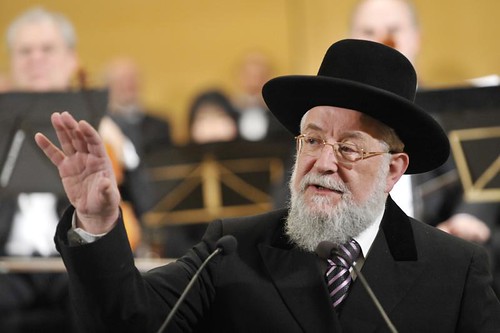August 22, 2011 (Section 1) (see also Section 2)
If you are reading in email or RSS feed, please click here to read ONLINE
Editor – Joel Katz
Religion and State in Israel is not affiliated with any organization or movement.
Haredim also have a place in the revolution
By Melanie Lidman www.jpost.com August 19, 2011
Despite efforts to cast the tent cities across the country as tolerant havens for both religious and secular activists, the tent cities across the country have been noticeably devoid of ultra-Orthodox activists over the past month.
Avi Abood, a 22-year-old Beitar Illit resident, is the exception to this rule.
Shas Rabbi Ovadia Yosef’s daughter meets J’lem tent protesters
Rabbi Ovadia Yosef's daughter member of social protest “alternative team of experts”
By Melanie Lidman www.jpost.com August 18, 2011
As the Jerusalem Tent City in Gan Hasus (Horse Park) celebrated its one-month anniversary, tent city organizers met on Wednesday with Rabbanit Adina Bar Shalom, daughter of Rabbi Ovadia Yosef, who is part of the alternative panel of experts offering independent advice to the protest leaders and acting as a bridge between government channels and the protesters.
By Amir Mizroch Opinion http://amirmizroch.com August 12, 2011
The religious parties, and especially Shas, must be watching the social protests with some alarm. The middle class is rising up and demanding a redistribution of the burden, and a reorganization of the national priorities.
And that’s the worst nightmare of the haredi leadership and the most serious threat to the ultra-Orthodox way of life – a way of life that relies on government handouts while most of their population stays out of the workforce.
Shas does not want the government to seriously address the plight of the middle class. It’s OK if Netanyahu throws them some crumbs, builds them a few houses here and there for the students, makes daycare tax deductible etc etc. But for heaven’s sake, don’t get confused Bibi! Don’t start turning things on their heads.
There is a divine order here: You secular middle class people work and pay taxes, and we ultra-Orthodox live off your taxes, get free housing, and bring a lot of Jewish children into the world to “balance the demographic threat from the Arabs.”
Editorial http://forward.com/ August 12, 2011
And what are the protestors in Israel demanding?
A government that is more egalitarian and attuned to the needs of ordinary middle class Israelis than it is to the ultra-Orthodox in the political sphere and the super-rich in the economic sphere. In other words, a government that embodies higher Jewish values.
Former Chief Rabbi Yisrael Meir Lau to social protesters: You've captured my heart
By Ben Hartman www.jpost.com August 16, 2011
Representatives from the National Union of Israeli Students and leaders of the tent city protest movement met Tuesday morning with former chief rabbi of Israel current Head Rabbi of Tel Aviv Yisrael Lau, where they held a discussion on the ongoing social justice protests.
Rabbi Lau backs social protests
www.ynetnews.com August 16, 2011
The meeting followed continuous efforts to join forces with the religious public, as part of the protest movement's aim to present a united front with all sectors of Israeli society.
Ex-Chief Rabbi Yisrael Meir Lau to protesters: You've captured my heart
By Ben Hartman www.jpost.com August 16, 2011
Lau’s endorsement of the movement represents the most prominent support yet given by a haredi leader in Israel to a movement that has been predominantly secular and has tried to avoid political or religious divisions.
Former budgets head: Netanyahu caused protests
By Meirav Arlosoroff www.haaretz.com August 21, 2011
Udi Nissan, Finance Ministry former budgets department head:
Unlike others, he thinks the division of resources within the government budget is relatively just, and doesn't favor particular sectors, he says.
The ultra-Orthodox receive money because they have large families, not because of their religious beliefs, and conditioning various support payments on having a salary would increase poverty, he says.
PMO chief on Haredim serving in the IDF
PMO chief tells Israeli social protesters government policy will not change
By Gili Cohen www.haaretz.com August 19, 2011
Eyal Gabai also said the ultra-Orthodox youngsters must serve in the army and go to work.
"They don't make money or take part in the economic burden, it's insanity," Gabai said. "We must stop this. The ultra-Orthodox must go to work and eventually serve in the army."
By Amnon Raz-Krakotzkin Opinion www.haaretz.com August 21, 2011
The [social] movement is seen less as an opportunity to cure Israel's social ills than an opportunity to restore the hegemony of the center and the left, of secular Ashkenazim.
An Un-Orthodox Israeli Wedding
http://ejewishphilanthropy.com August 17, 2011
So Inna and Pavel’s marriage ceremony will not be recognized in the Jewish state, despite its traditional Jewish symbols and ties to current Jewish culture, the couple’s world view and Israeli secular way of life.
In order to gain legal recognition and registration status as a married couple by the Ministry of the Interior, Inna and Pavel will need to travel out of Israel and marry in a lawful civil ceremony abroad.
The Tu B’Av Festival of Love, was held for the third year in Tel Aviv by Havaya – Secular Jewish life cycle ceremonies in Israel; Fishka – a young Russian speakers community in Israel; and with the support of Genesis Foundation (GPG), the New Israel Fund and the Posen Foundation.
Click here for additional PHOTOS
Can Israel be both a Jewish and a democratic state?
By Asher Maoz Opinion www.thejc.com August 18, 2011
Asher Maoz is a law professor at Tel Aviv University. He is the editor of 'Israel as a Jewish and Democratic State' (Jewish Law Association, 2011).
Much of the controversy over the question whether "Jewish" could be "democratic" stems from opposing approaches to the meaning of "Jewish", as well as "democratic", in the basic laws' formula. Those who regard the Jewish state as non-democratic have in mind a halachic state based on the laws of the Torah.
Such a state cannot be democratic. In a Jewish religious state, there is no room for tolerance towards a secular way of life.
Moreover, in a democratic state, sovereignty is entrusted to the people; in a halachic state, the only sovereign is God Almighty. The basic norm in such a state is that the commandments of the Lord must be obeyed.
Human Rights in Jewish Law: Contemporary Juristic and Rabbinic Conceptions
By David Wermuth www.law.upenn.edu April 24, 2011
The divergences and convergences of human rights jurisprudence between (1) how the concept of human rights developed in Jewish law before statehood, and (2) how several modern Jewish law thinkers approach human rights in Jewish law, along with (3) how those compare to the methods used by the Israeli Supreme Court when it incorporates Jewish law into its discussions on human rights, demonstrate how Jewish law—as part of the Jewish nature of the State of Israel—does not per se contribute to the human rights problems facing Israel today.
Sacred Music: "new models that will sustain the spiritual life of the reborn Jewish state"
By Rabbi Marc Rosenstein Opinion http://blogs.rj.org August 16, 2011
It seems that the denominational models we Ashkenazic Jews built in our European and North American Diasporas may in the end not be the models that will sustain the spiritual life of the reborn Jewish state.
As these models encounter eastern traditions, and the new reality of a secularized Hebrew culture, new syntheses are only now beginning to appear. It is exciting to contemplate what "Torah will go forth from Zion" a generation from now.
Woman divorces brain-damaged husband
By Akiva Novick www.ynetnews.com August 18, 2011
For the first time in Israel, a woman will be allowed to divorce her dysfunctional husband thanks to a legal precedent.
An alternative rabbinical court granted the secular women the longed-for divorce, which she had not been entitled to by law. The precedent was achieved thanks to a new alternative halachic book of law presenting solutions for a variety of halachic conflicts.
Recalcitrant Wives: Refusing the Ketubah – Part 1
By Caryn Noveck Opinion http://cwjisrael.wordpress.com August 17, 2011
The Ketubah is a woman’s last moment of choice, and I wonder why more of us don’t make a different one.
After all, how many self-proclaimed Jewish feminists march, donate, and agitate for global women’s rights at every opportunity, while at the same time proudly displaying their Ketubah as a work of art in their home? Is the choice to participate in the system that creates Agunahs really one to be proud of?
If marriage is either a looming possibility or your official relationship status, did/will you have a Jewish wedding? Who signed/will sign the Ketubah? Do you know what it says in your Ketubah?
How much did you know about women’s status in the Jewish divorce process before you got married?
What, if anything did your Rabbi tell you about the rules of Jewish divorce before you got married? If you had reservations, did you still choose to have a religious marriage anyway? Why, or why not? What made up your mind?
Woman fined 200,000 shekels for refusing to divorce husband
By Revital Hoval www.haaretz.com August 14, 2011
A family court in northern Israel ruled Sunday that a woman owed her husband NIS 200,000 for refusing to divorce her husband, despite the fact that the rabbinic court has required her to do so.
Judge Marina Levy ruled that the woman must financially compensate her husband for violating his autonomy.
Meet Brother Daniel: A Jew-converted-Christian-turned-monk
By Shalom Goldman www.haaretz.com August 18, 2011
Shalom Goldman is Research Professor of Religion at Duke University. His most recent book is " Zeal for Zion: Christians, Jews, and the Idea of the Promised Land."
In the struggle over definitions of Israeli and Jewish identity, Oswald Rufeisen, better known as Brother Daniel, was a pivotal figure.
The case that Rufeisen (1922-1998 ) took to Israel's High Court of Justice in 1962 brought the question of "Who is a Jew?" to public attention in a new and startling manner.
Knesset Set To Define ‘Jewish State’
By Nathan Jeffay http://forward.com August 16, 2011
A proposal likely to pass the Knesset would for the first time clarify what it means that Israel is a Jewish state, sparking controversy over its potential to clash with principles of equality and civil liberties.
...In cases where a law or government practice is designed to support the state’s Jewish character but judged to violate democratic norms, the new bill would also empower judges to affirm its validity based on its support of the state’s Jewish character.
Currently, laws or practices that serve the Jewish character are legally acceptable only so long as they do not clash with the state’s democratic character.
“I’m really afraid that this bill may be enshrined eventually as the ‘basic law of racism,’” said Yedidia Stern, vice president of research at the Israel Democracy Institute. He fears that it could “basically disarm the court from interfering in what the Knesset would be doing in the future.”
To the Editors:
...To ensure the continued existence of the Jewish people as a people, as well as the the continued vibrancy of the State of Israel as a Jewish and democratic state, it is necessary and even essential to sever all connections between the state and halacha—that is, the hegemony of any denominational interpretation, from the most lenient to the most strict—and the sooner the better. The appropriate place in the State of Israel for halachic dialogue and Jewish Law should be in what is often referred to as “civil society.”
...Put bluntly, halacha as currently defined has no place in the state, since it stands above the state and its values. If applied as law, it can lead to anarchy and disorder; it is often coercive and discriminatory; is not necessarily just; and it is answerable only to a higher authority, whose representatives on earth have not in fact, and will not in theory, yield to human rights principles and values.
Susan Weiss
Founder and Director, Center for Women’s Justice
Jerusalem
To the Editors:
...At times, the power of halacha lies precisely in its assertiveness and unwillingness to bend to changes. In this respect, then, this is not “halacha’s moment of truth,” but rather the moment of truth for the state and its elected leaders: Will our representatives have the wisdom to frame laws that create a healthy balance between the state’s Jewish identity and its increasingly diversified needs?
Elisha Rosensweig
Ra’anana
Evelyn Gordon and Hadassah Levy respond:
It is precisely those who care most about halacha who ought to be most committed to helping it adapt—for halacha’s own sake, as well as for that of the state.
For a divorce between halacha and the Jewish state would be disastrous for both. Halacha, banished back to its civil-society ghetto, would be deprived of the national stage on which it was meant to perform. And the state, severed from the halachic roots of its Jewish traditions, would ultimately see its Jewish character wither away.
Opening American Eyes to Israel's Diversity
By Sarah Schonberg Opinion http://forward.com August 10, 2011
Sarah Schonberg is BBYO’s Friends & Alumni Network and Development Communications Director.
Only when American Jewry exposes its youth to all the stories that make up Israeli society will we be able to remove the indifference that has built up over decades of recounting only one story.
Living in fear of exposing our community to the complexity of Israel is backfiring and is resulting in a generation of disengaged Jews. By purposefully keeping ourselves in the dark, by hiding from the reality of Israel, we are robbing ourselves of our homeland.
Getting More Jews To Spend Time In Israel
By Stewart Ain www.thejewishweek.com August 9, 2011
Misha Galperin:
There is a big gap between going to Israel for 10 days and going for five months to a year, so we are now working on filling in the gap with medium-term programs like summer or one- or two-month programs.
We believe Birthright Israel is a great door opener, but it needs follow-up. Coming to Israel for a second and third time for more in-depth experiences with Israeli society and people is the best follow-up. So this year we will pilot a variety of things to see what works best.
Future Leaders Program Concludes Israel Leg
http://ejewishphilanthropy.com August 16, 2011
The Ministry of Information and the Diaspora, in conjunction with World ORT and Stephen Muss, launched a new project this year aimed at inspiring and nurturing the next generation of leadership for local Jewish communities across Europe and the Former Soviet Union.
An initial cohort of 32 students, representing 18 countries and between 15 and 18 years old, was selected based on the quality of their applications and the dedication that they had already demonstrated to their schools and in their Jewish communities.
Community aliyah program reinstated for Americans
By Raphael Ahren www.haaretz.com August 19, 2011
New immigrants from North America will again be able to join a government-sponsored program offering additional financial grants to newcomers, Anglo File has learned.
Newcomers who move to certain localities can now apply for the Immigrant Absorption Ministry's popular Community Aliyah program, which offers immigrants rent assistance payments of up to NIS 7,000 and other perks.
North American Jews Immigrate to Israel
www.jafi.org.il August 16, 2011
Barry Spielman, the Jewish Agency Head of Aliyah Delegation in North America and Yaron Neudorfer, Chief Financial Officer of the Jewish Agency together with other dignitaries say Bon Voyage to 104 young people making Aliyah and will be serving in the IDF.
104 would-be soldiers arrive en masse to join IDF
By Gil Shefler www.jpost.com August 17, 2011
One might wonder why Stern and the other army recruits on the flight chartered by Nefesh B’Nefesh, an organization facilitating immigration to the Jewish state, would trade a life of relative comfort in North America for the Spartan existence of a soldier in the IDF.
After all, most had never lived in Israel before and, unlike residents of Israel their age, they were under no legal obligation to join.
The answers to the question varied and were often complex. For some it was a simple matter of family background.
Record 104 North American Recruits Join IDF
www.thejewishweek.com August 15, 2011
This year's effort marks the second year Nefesh B'Nefesh and Friends of the IDF have partnered to help newly arrived soldiers with their transition into their new lives in Israel.
As a result, these soldiers receive financial grants, social support, quarterly care packages and post-army integrative services, including educational guidance, career counseling and job placement.
By Raphael Ahren www.haaretz.com August 19, 2011
"I'm incredibly excited and equally petrified at the same time," said Matthew Silverman, 22, from Chicago.
By Rabbi Shmuley Boteach Opinion www.huffingtonpost.com August 17, 2011
No Jewish organization on earth provides it more inspirationally than Birthright. Still, it can be made better. Here is how:
On day one when you read all the rules to the newly arriving participants, don't treat them like children. These are young adults.
- Birthright needs substance, and I suggest a stronger values-based component...
- Expect something in return...
- Continuity, continuity, continuity. Its absence is the biggest problem of all for Birthright.
The Sons Immigrated, Time for the Parents to Join
By Elad Benari & Yoni Kempinski www.israelnationalnews.com August 17, 2011
The couple sent their children to yeshiva in Israel, knowing that it would lead to the entire family eventually moving to Israel.
“Once they were here and I knew how they felt about it, I knew that they would want to be here and that we would follow them,” said Ama.
August 22, 2011 (Section 1) (see also Section 2)
Editor – Joel Katz
Religion and State in Israel is not affiliated with any organization or movement.
All rights reserved.






